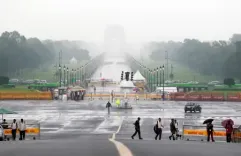Why Did ED Conduct Raids on Travel Agents Linked to the 'Dunki Route'?

Synopsis
Key Takeaways
- ED's raids target travel agents linked to illegal immigration.
- Over 11 locations in Punjab and Haryana were affected.
- Experts point to economic distress as a driver for migration.
- Young aspirants face significant risks through illegal routes.
- Legal immigration pathways exist, primarily through study permits.
Chandigarh, July 9 (NationPress) The Enforcement Directorate (ED) executed a series of raids on Wednesday throughout Punjab and Haryana targeting travel agents associated with the 'Dunki route'. This route gained attention following the recent deportation of Indian nationals from the United States, as confirmed by ED officials.
Authorities have acknowledged that this crackdown aims to dismantle the operations of travel agents engaged in human smuggling through unauthorized pathways, which mainly stem from developing nations.
The extensive raids spanned 11 locations in both states, including cities like Amritsar, Patiala, Moga, Ambala, Kurukshetra, and Karnal, and were coordinated by the ED's Zonal Office in Jalandhar.
A noteworthy incident occurred in February when a US military aircraft landed at the Amritsar International Airport, carrying 104 undocumented Indian immigrants. This marked the initial deportation event during President Donald Trump's second term.
The deportees included 30 individuals from Punjab, 33 each from Haryana and Gujarat, and others from Uttar Pradesh, Maharashtra, and Chandigarh.
The 'Dunki' method has emerged as a common tactic for individuals seeking better opportunities in the US or Europe.
Experts attribute the rise in illegal immigration to the agrarian crisis, which has led to widespread unemployment in both Punjab and Haryana. The shrinking size of farmlands, coupled with soaring agricultural costs, has made it increasingly challenging to sustain a decent livelihood.
Despite the alarming narratives surrounding the 'Dunki route', the allure of a prosperous life in Western nations remains a powerful temptation for the youth, especially those from Punjab, Haryana, and Gujarat.
Travel and immigration agents are continuously devising new strategies to transport hopeful candidates into the US and European countries via alternative routes, often navigating treacherous terrains.
Reports indicate that immigrants may traverse more than 1,500 miles through Mexico under extreme conditions in pursuit of asylum in the US.
Immigration consultants in Chandigarh have noted that obtaining a study permit is the most legitimate pathway for individuals aiming to reside in the US, Canada, and other Western nations.
Most international students are permitted to work, particularly in Canada and the UK, while pursuing their studies. They mentioned, 'There are distinct requirements for on-campus and off-campus employment. Generally, international students can work off-campus for up to 20 hours a week in Canada. Many Indian students find jobs in the food service, retail, and hospitality sectors.'
Given the high demand in Punjab, numerous immigration and admissions consultancy firms have established operations across Punjab, Haryana, and its capital city, Chandigarh.







